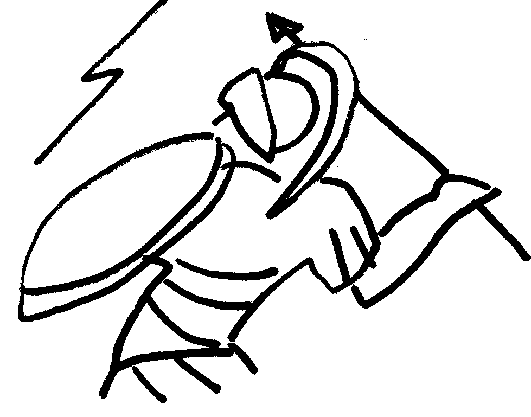Print to help learners
The Story of the Months

In 12 Help-Yourself-to-Read modes
that can be printed off or down-loaded
NOTE: 1. Change fonts to whatever suits your learners; the font
and sizes used here are simply to be accessible to all browsers.
NOTE 2. Check in your Print Preview that each of the 12 Months is on a
separate page.
See instructions at the end of this
page, for how to use these stories to best effect
The Calendar set here is actually a demonstration of
twelve modes of 'making print more interesting'.Each mode should
also be read applied separately to a whole story or nonfiction
piece, so that their messages are clear and not confused by too
much variety at once.
The Help Yourself to Read modes illustrated here
are:
- January -
The most common words
are marked as 'sight words'. They make up almost half the words in
any text. Know these common words, and see how much you can read
already!
- February
- Long words are split up for easier decoding and putting
together.
- March
-
Nouns are hi-lighted,
to help make sentence structure clearer.
- April
- Verbs hi-lighted,
to help make sentence structure clearer.
- May
- The letters not used in
reading are in smaller grey print.
- June - 'Spelling
traps' are hi-lighted. 'Silent e' that shows how to
pronounce a long vowel before it is not marked.
- July
-
Size-training - a story in
print that gradually gets smaller.
- August -
Vocabulary clues -
difficult words are given meanings to define them as part of the
text itself, rather than needing a dictionary to look up, which
can be bothersome and often avoided.
- September
- Multilevel story on the
same page, so that weak readers can discover how to read more
difficult text, and better readers can look back if they are
finding the harder text too much - and nobody in a mixed ability
class knows who is reading at which level.
- October
- Spelling clues
provided for words with irregular
spellings.
- November -
Spelling patterns. See what
other words you can add with the same spelling patterns, and see
if you can fill in the blanks.
- December
- Vowels hi-lighted to
show word structure. Plain spellings in red, tricky spellings in
blue
- 'Thirty days has September' - 12
Months in phrases
The story of the 12 months
is the story of old dead gods and ghosts.
January
The most common words are marked as 'sight words' that make up
almost half the words in any text.
Know them, and see how much you can read alredy! See how much
a beginner knows already.

The 'old
'Romans
'had 'a 'god 'called
'Janus,
'with
'two
'faces 'and 'a
'key
'in 'his 'left
'hand. 'One
'face
'looked back 'at 'the
'old
'year,
'and 'one
'face'
looked
'forward
'to the 'new 'year.
'Janus 'was
'the
'god
'of
'Be-ginn-ings
and
Ends.
'His
'tem-ple
'was
'kept
'o-pen 'during
'war 'and 'was
shut
'in 'times 'of
'peace. If a
Roman
wanted to begin a
matter
well, or to make a
good end
of it,
they
asked
Janus for
help.
Janus was the
door-keeper
of the
Roman
heaven, and he was
the
god
of
their
doors
and
gates
too. His temple
had
twelve
doors to it, just as
the
year has
twelve
months.
The
month
of
January
is
a
time to
look
back to the
past,
and also a
time to
look
forward
to
the
future,'with what the
past
can
bring
to
it.
February
- a story with long words
already split up for easier decoding and putting together again.
Feb-rua-ry is the sec-ond
month.
Once it was the last
month in the
year. Then it was
made the second
month, then it be-came the
last one
a-gain, and now it is back to
be-ing
the second month
again. It has only
twen-ty - eight days, but every
fourth
year is a Leap
Year, and then
February has an ex-tra day, and
is
twenty-nine days. So February is
the most rest-less and
un-set-tle-d
month in the cal-en-dar.
The Ro-mans had a fest-i-val
called
Feb-rua, a time for clean-ing and
pur-i-fy-ing.
How-ev-er, they al-so
cel-e-brate-d it by over-eat-ing.
March
- a story
with nouns distinguished, to help make sentence structure
clearer.

March
'is 'named 'after 'Mars, 'the
'Roman 'god
'of
'war.
'His
'chariot
'was 'drawn by two horses
'named
'Terror
'and
'Flight, 'and
'lightning
'played 'around 'his helmet.
The
Romans
thought
he
was more than a fighter
-
he
was so strong. They
prayed to
him
for
rain,
and asked
him
about their private
affairs. Before
a battle,
they fed his sacred
chickens.
If the
chickens were hungry, the
soldiers
said that it meant
that Mars
would help
them.
If the chickens
did not want to eat,
they
were afraid that
Mars
was not on their
side.
April
- a story with verbs distinguished, to help make
sentence structure clearer.
 April
'was
'not 'a 'god 'or April
'was
'not 'a 'god 'or
goddess. 'She 'was
'the 'spirit
'of
Spring.
In the Old World in the North,
the month of April
begins
the
spring -time. The spirit of April
opened
the spring-
time.
After the cold northern winter,
the earth
wakes
and the buds
come
out on the trees and the
birds
sing.
May
The letters that are not used or sounded in
reading are set in smaller grey print.
 The
Roman goddess Maia was The
Roman goddess Maia was
the
daughter
of Atlas. The
giant Atlas was supposed
to
bear
the
weight
of the
earth
on his shoulders,
with all its mountains and
seas.
His seven
daughters
lived
on a mountain, until the
father of the gods set them together as stars in
the sky, in a cluster called
the Pleiades.
Maia was the mother of
Mercury,
who
ran swiftly from
heaven
to
earth
on
winged feet with messages for the gods and goddesses, and
who
is
still
the emblem of international
communication.
Because
he ran around so
quickly,
the metal quicksilver
is
named
Mercury after him.
June -
a story with 'spelling traps' hi-lighted.
'Silent e' is not hi-lighted if it shows how to pronounce a long
vowel before it
 Some
'people
'say 'that 'June 'is 'named 'after 'the 'Roman
'goddess
'Juno,
'the 'Queen
'of
'their
'gods. Some
'people
'say 'that 'June 'is 'named 'after 'the 'Roman
'goddess
'Juno,
'the 'Queen
'of
'their
'gods.
Others say that
June 'is named after a man
named
Junius.
Juno
was
the
beautiful
and
jealous
wife of
the King
of
the Roman gods,
Jupiter.
She drove about in a
chariot
pulled
by
wonderful
peacocks.
Junius
was
a proud man
who
does
not
deserve
to
have
a
month
named after him.
June is the start
of
the summer of
the North and the start
of
winter in the South.
July
- a story in print that gradually gets
smaller, to help acclimatize to reading smaller print.
July 'is 'named 'after 'the 'great 'Roman ruler
Julius 'Caesar. 'He 'named 'the
month of July after himself when
he set out to reform the calendar.
'Julius Caesar was a great law-maker,writer and
soldier. When he set out to reform the calendar, he made
the
fifth month into the seventh month.
As
the fifth month was called
Quintilis,
which meant
the fifth, the name did not fit any more when
it became the seventh. Julius Caesar was born
in the seventh
month, so he said it should be named
after himself. Nobody else has yet got around
to re-naming September, October,
November or December
after themselves.
Yet.
Why not?
August
- Clues to vocabulary. Difficult words are given meaning
to define them as part of the text itself, rather than needing
a dictionary to look up, which can be bothersome and easily not
done at all.
Julius 'Caesar, 'the 'ruler 'of 'Rome, 'had 'a 'relative,
'the grand-son of his sister, who was called Octavius. When
Octavius became ruler of Rome after him, and made himself Emperor
of the Roman Empire, the people wanted
to
honour
and show they admired him.
So they called him
Augustus, meaning noble,
fine and
splendid.
Then they called the eighth month
August after him, which also
delighted
and pleased
Augustus.
August was the month when he had been
made an
official
consul, a step on his way
to
power
as ruler.
August was also the month when he ended
his wars to gain power, and when he won a battle
to
conquer
and master Egypt - and Cleopatra.
September
- Story with multi-levels on the same page, so that weak
readers can discover how to read more difficult text, and better
readers can look back if they are finding the harder text too much
- and nobody in a mixed ability class knows who is reading at
which level.
September is
the 9th month. But its name
means seven. Once it
was the 7th month,Septem. Then it
was changed to the 9th
month but its name
was not changed.
|
September
is the ninth month in the calendar - and yet its name
means seven. It used to be the seventh month, Septem, and
then its place was changed but not its name. Nobody gave
it another name, not even their own name, and so the
silly name has stuck.
September
is the ninth month in the calendar - and yet its name
means seven. It used to be the seventh month, Septem, but
then its place was changed. And nobody changed the name,
not even to take the glory of giving it their own name.
So the odd discrepancy remains.
(Sometimes a boy is named Septimus because he is the
seventh child, or because he was born in September.
Perhaps some seventh children have been born in September
too. Then they could be called Septimus for a double
reason!)
|
October
- Spelling clues for reading
October is another
strange name. It is
the tenth month
and yet its name
October means the eighth
month which
it once
was.
(An Octopus
has eight
legs and an
Octagon has eight
sides.)
|
Oct-o-ber iz
anuther
strainj
naim.
It
iz
the
tenth
munth,
and yet
its
naim
meens the
ait-th
munth, which
it
wunss
wos.
(An
octo-pus - as in
pussy-cat - has
ait
legs
and an octagon
has
ait
sìds.)
|
November - spelling patterns
See what other words you can add with the same
spelling patterns, and see if you can fill in the blanks.
November means nine but it is
the eleventh
month. There are
four months whose places
were changed, but not
their names.
When the French had a
revolution they
changed the names
of the months and
days right away from the
old Roman names but
later the Roman
names came
back to France
too.
|
December
September
fine line
how bow
tis
monkey
where
-
races faces
-
hut rut
heir
hen then
mad lad
grey prey
tames lames
-
sand land
night light
Tom Rom
-
games blames romance
cater hater
we be
dance trance
|
leans beans
cut nut
fit sit
seventh
weed seed
pour
lose
ranged
got rot
flames dames drench trench convolution solution
arranged
monk
ways rays
stay day
cold gold
shut strut frames shames sack tack
do who
boo-hoo.
|
December
Vowels are hi-lighted to show word structure.
Plain spellings are in red, tricky spellings in blue.
December
'means
'ten,
'as
'in
'decimal
'numbers
'and
decimate
(killing
'off
'one
'in
'ten).
Now December
is
the
twelfth
month!
If
you
could
name
the
last
month
of
the
year,
what
name
would
you
give
it?
Shoppers'
Delight?
Festive
Month?
Givingtime?
Year's
End?
Dozen-ber? 
Making print more interesting
The 12 months of the
year
in phrases to make it easier to see the sense
of the text.
Thirty 'days 'has 'September,
'April,
'June
and
'November.
'
All 'the 'rest 'have 'thirty-one,
except for
February
alone,
and that has twenty-eight days clear,
and
twenty-nine
in each Leap year.
Thirty days
has September, April, June
and November. All the rest have thirty-one, except for February
alone, and that has twenty-eight days
clear, and twenty-nine in each Leap year.
I hope you have had a lot of fun with all this.
val yule
Instructions: How to read 12 months of interesting print
Who:
For older learners of
literacy, remedial students and upper primary school.
How:
For reading with someone
else, but you in charge. These instructions are important. Someone
else can read them to you.
1. First, the Learner (you)
look
over the 13 pages, to
see what they are like.
2. For each month's story,
someone else does the
reading while you run a
biro-end under the words and pause at words you know and read them
out, then the someone-else goes straight on.
3. If you are reading well,
then you can do the reading, and pause with the biro-end when you
can't read a word. The other reader immediately reads that word,
and then you GO STRAIGHT
ON, without repeating
that word. That way, the sense of the piece is not lost by
repetition and stumbling.
4. If you are having trouble
with most words, the other reader can often help with giving the
beginning or all the
sounds of the easiest
words, so you can hear how the sounds blend into the
words.
5. After each month's story,
you ask one
question at least of
the other reader. It can be about the story or the words or the
spelling or anything, but it has to be at least one question. The
learner asks the questions - not the teacher or the other
reader.
6. At the end, when the helper
is not there, read
alone thru the whole
Reading Print piece with all the stories of the months set out
plainly, and underlines all the words that you can now read. (Stop
every time you need a break.)
7. Later the helper can help
with all the words that could not be read easily. You could then
read the whole set
together again in the
same ways as before, stopping when you feel like it.
8. Then you can underline more
words that can be read - until it is all underlined.
Practising
re-reading is a good
way to develop fluent reading habits.
Let's know how you get on and
any good ideas that you have.
Send Email
Back to Ozideas Home Page
|